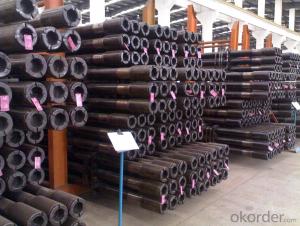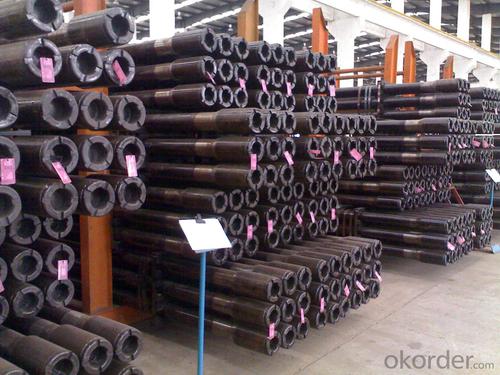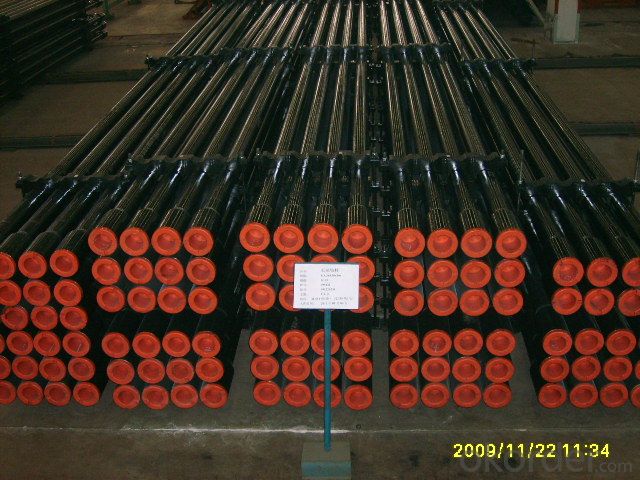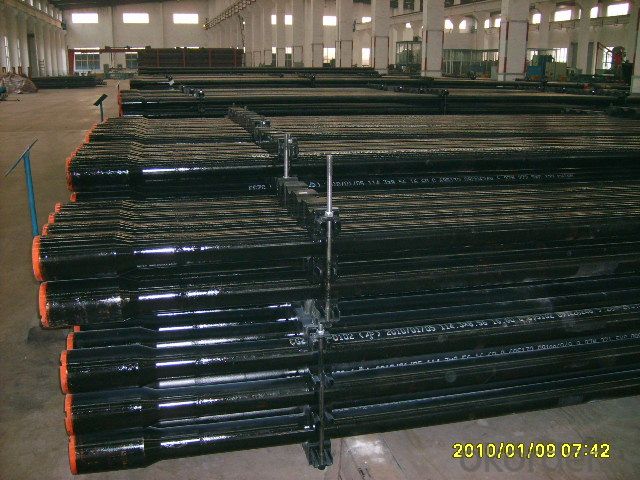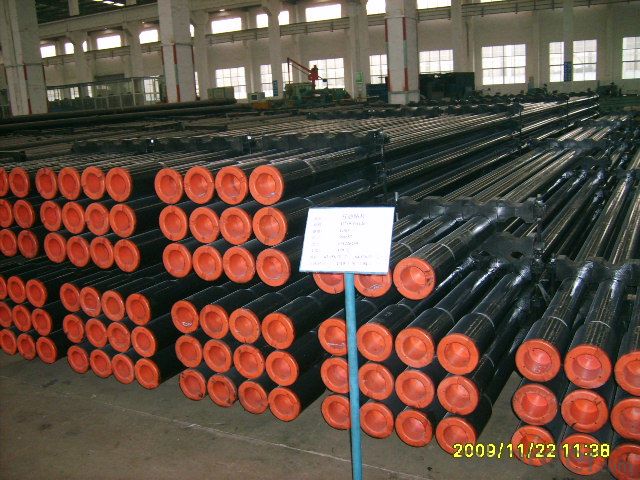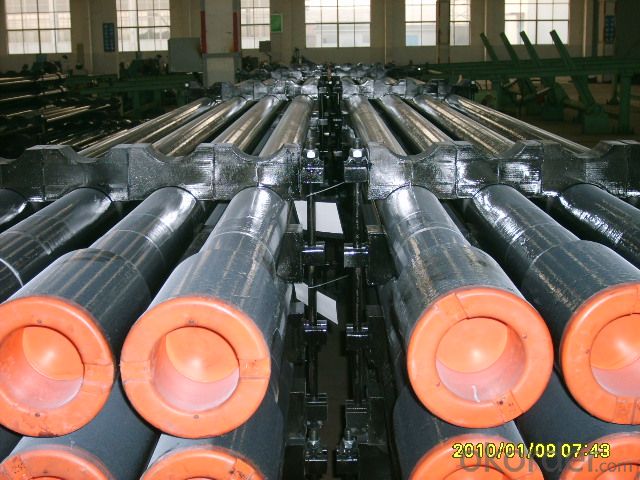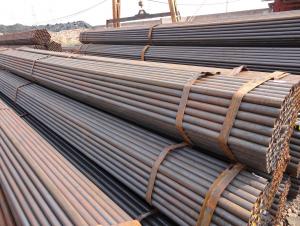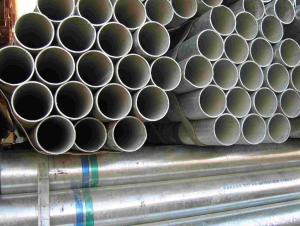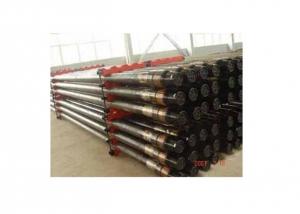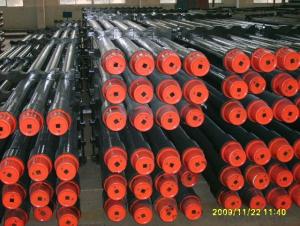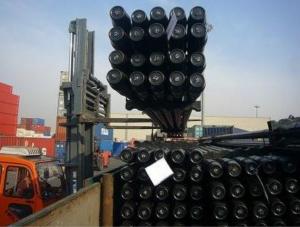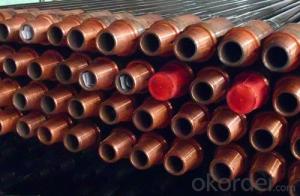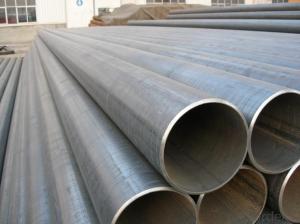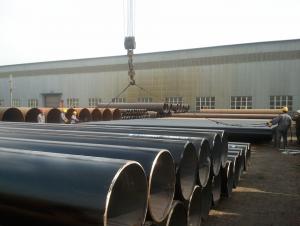2 3/8--5 1/2 API 5DP drill pipe good price
- Loading Port:
- Qingdao
- Payment Terms:
- TT OR LC
- Min Order Qty:
- 10 m.t.
- Supply Capability:
- 100000 m.t./month
OKorder Service Pledge
Quality Product, Order Online Tracking, Timely Delivery
OKorder Financial Service
Credit Rating, Credit Services, Credit Purchasing
You Might Also Like
Specifications
1) OD: 2 7/8", 3 1/2", 4", 4 1/2", 5" 5-1/2"
2) Steel Grade: E75, X95, G105, S135
3) All drill pipe are made according to API
1) OD: 2 7/8", 3 1/2", 4", 4 1/2", 5" 5-1/2"
2) Steel Grade: E75, X95, G105, S135
3) Type of end finish: EU-external upset, IEU-internal & external upset
4) All drill pipe are made according to API 5D
5) We can provide in many conditions, with or without hard banding (Arnco100, Arnco300, tungsten carbide etc).
- Q: What does seamless steel tube mean? What are the main uses? What are the classifications?
- 1.: Construction of the underground pipeline, levy more pumping, boiler hot water transportation etc..2., mechanical processing, bearing sets, processing machinery parts.
- Q: Can steel pipes be used for oil drilling operations?
- Yes, steel pipes are commonly used for oil drilling operations due to their strength, durability, and resistance to high pressure and extreme temperatures.
- Q: Can steel pipes be used for conveyor systems?
- Yes, steel pipes can be used for conveyor systems. Steel pipes are commonly used in conveyor systems due to their high strength, durability, and ability to withstand heavy loads and harsh environments. They provide a reliable and long-lasting solution for transporting various materials in conveyor applications.
- Q: How are steel pipes protected against rusting?
- Steel pipes are protected against rusting through a process called corrosion protection. There are several methods employed to prevent rust formation on steel pipes, including: 1. Coatings: One common method is applying various coatings to the surface of the steel pipes. These coatings act as a barrier, preventing oxygen and moisture from reaching the metal surface and initiating the rusting process. Coating options include epoxy, polyethylene, zinc, or even a combination of these materials. 2. Galvanization: Galvanizing steel pipes involves immersing them in a bath of molten zinc. This process creates a protective layer of zinc on the surface of the pipes which acts as a sacrificial barrier. If any small areas of the pipe surface are exposed, the zinc coating will corrode instead of the steel, providing ongoing protection against rust. 3. Cathodic Protection: This method utilizes an electrical current to protect the steel pipes. By connecting the pipes to a sacrificial anode, usually made of zinc or magnesium, the anode will corrode instead of the steel pipes when exposed to moisture and oxygen. This process is commonly used in underground or underwater applications. 4. VCI (Vapor Corrosion Inhibitor) Technology: VCI technology involves the use of chemical compounds that release a vapor that protects the steel pipes from rusting. These compounds form a thin layer on the surface of the pipes, inhibiting the corrosion process by neutralizing oxygen and moisture. 5. Regular Maintenance: In addition to the above methods, regular inspection and maintenance are crucial to prevent rust formation on steel pipes. This includes cleaning the pipes, removing any accumulated debris or corrosive substances, and repairing any damaged coatings or protective layers. Overall, these methods of corrosion protection effectively safeguard steel pipes from rusting, ensuring their longevity and durability in various industrial, commercial, and residential applications.
- Q: Heating system DN40 and DN32 welded steel pipe how to connect?
- As for the flange connection: low pressure pipeline is generally not used in this way, can be divided into threaded flanges and flange welding flange, and the flange connecting pipes of different diameters, only the welded flange to diameter, said in a low pressure pipeline which has low pressure pipe connection make an unnecessary move, this is not much, but there are also people with non the standard flange for connecting different pipe diameter, which is not consistent with the technical specification!
- Q: How are steel pipes used in the manufacturing of marine applications?
- Steel pipes are commonly used in the manufacturing of marine applications due to their durability, strength, and resistance to corrosion. They play a crucial role in various applications such as shipbuilding, offshore platforms, and underwater pipelines. Steel pipes are used to transport fluids, gases, and oils, as well as for structural support and protection against harsh marine environments. Additionally, steel pipes are also utilized in the construction of marine heat exchangers and cooling systems.
- Q: Can steel pipes be used in high-pressure applications?
- Yes, steel pipes can be used in high-pressure applications. Steel pipes are known for their strength and durability, making them suitable for handling high-pressure fluids or gases in various industries such as oil and gas, chemical processing, and power generation. They are designed to withstand the stress and pressure exerted on them, ensuring reliable performance and safety in high-pressure environments.
- Q: What is the hardness of steel pipes?
- The hardness of steel pipes varies depending on the specific grade and manufacturing process used. However, steel pipes are generally known for their high hardness and durability, as they are often designed to withstand heavy loads, abrasive environments, and high-pressure conditions.
- Q: What is the typical diameter range of steel pipes?
- The typical diameter range of steel pipes can vary widely, but it commonly falls between 0.5 inches to 48 inches.
- Q: How are steel pipes used in the manufacturing of power distribution systems?
- Steel pipes are commonly used in the manufacturing of power distribution systems as they provide a reliable and durable solution for transporting and protecting electrical cables. They are used to create conduits that house the cables, ensuring safe and efficient transmission of electricity throughout the system. Steel pipes also offer resistance to corrosion, fire, and extreme weather conditions, making them a suitable choice for power distribution systems.
Send your message to us
2 3/8--5 1/2 API 5DP drill pipe good price
- Loading Port:
- Qingdao
- Payment Terms:
- TT OR LC
- Min Order Qty:
- 10 m.t.
- Supply Capability:
- 100000 m.t./month
OKorder Service Pledge
Quality Product, Order Online Tracking, Timely Delivery
OKorder Financial Service
Credit Rating, Credit Services, Credit Purchasing
Similar products
Hot products
Hot Searches
Related keywords
